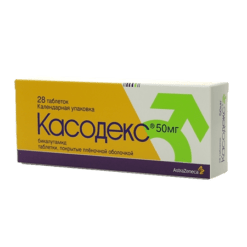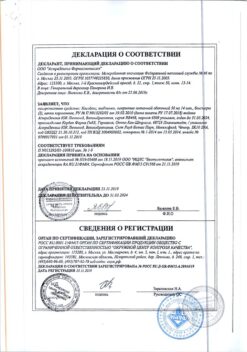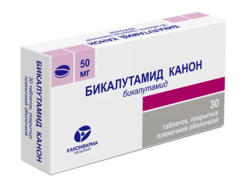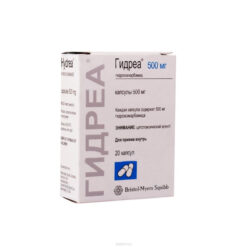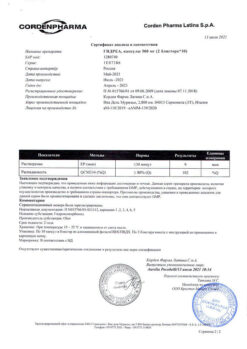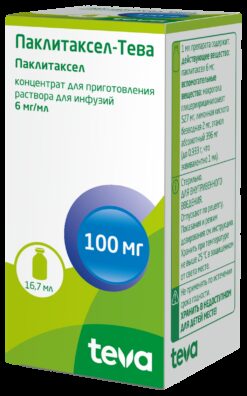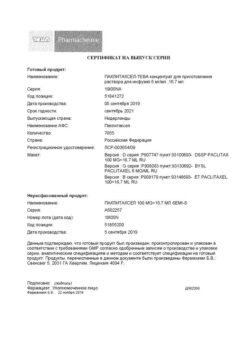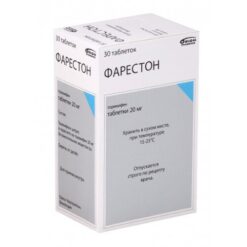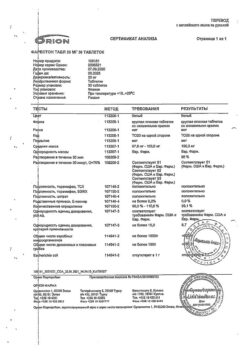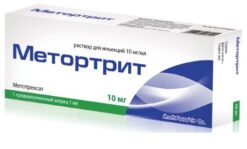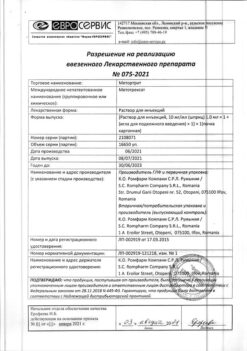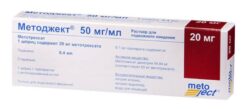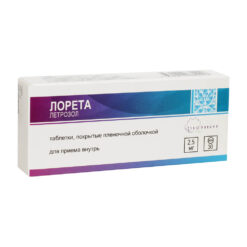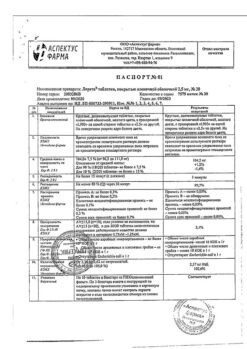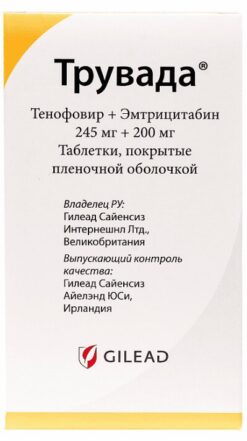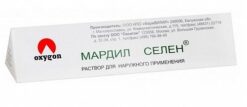No products in the cart.
Description
Antitumor agent, nonsteroidal antiandrogenic drug – a competitive antagonist of endogenous androgens.
Binding to receptors on the surface of target organ cells makes them inaccessible to androgens, while increasing the concentration of hormones in plasma. This results in regression of prostate neoplasms.
The administration of bicalutamide at a dose of 150 mg/day to patients with localized (T1-T2, N0 or NX, MO) or locally advanced (T3-T4, any N, MO; T1-T2, N+, MO) prostate cancer reduces the risk of disease progression by 42% and the relative risk of bone metastases by 33% during follow-up of up to 2 years.
However, the effectiveness of bicalutamide on survival rates is lower than that of surgical castration.
In some patients, discontinuation may lead to the development of “withdrawal” of antiandrogens (after withdrawal, a temporary stabilization of the disease occurs in 10-15% of patients).
Pharmacokinetics
After oral administration it is quickly and completely absorbed from the gastrointestinal tract (food intake does not affect absorption).
The binding to plasma proteins is 96-99%.
It is extensively metabolized in the liver (by oxidation and formation of conjugates with glucuronic acid) to inactive (S)- and active (R)-enantiomers. TCmax of the (R)-enantiomer is 31.3 h. The (S)-enantiomer is eliminated from the body much faster than the (R)-enantiomer; T1/2 of the latter is about 7 days. When bicalutamide is taken daily at a dose of 150 mg/day, the Css (K)-enantiomer in plasma is 22 µg/ml. At Css about 99% of all circulating enantiomers in the blood is the active (R)-enantiomer. When taken daily, the plasma concentration of the (R)-enantiomer is increased about 10-fold due to prolonged T1/2.
Extracted as metabolites by the kidneys and in the bile in equal proportions. Pharmacokinetics of (R)-enantiomer is independent of age, state of renal function with moderate hepatic impairment; elimination of (R)-enantiomer from plasma is delayed in patients with severe hepatic impairment.
Indications
Indications
Active ingredient
Active ingredient
Composition
Composition
Excipients: lactose monohydrate – 88.93 mg, sodium carboxymethyl starch – 5 mg, colloidal silica – 0.45 mg, povidone – 4.5 mg, magnesium stearate – 1.12 mg.
Shell composition: opadray white (Y-1-7000) – 3.75 mg (hypromellose 5 cP – 2.344 mg, titanium dioxide – 1.172 mg, macrogol 400 – 0.234 mg).
How to take, the dosage
How to take, the dosage
In advanced prostate cancer, oral, 50 mg/d once daily in combination with a GnRH analogue or surgical castration.
In non-metastatic prostate cancer in situ, as monotherapy (if surgical castration or other drugs are contraindicated), 150 mg/d once daily.
Bicalutamide should be taken long-term, for at least 2 years.
In patients with moderate to severe hepatic impairment, dose adjustment is required.
Interaction
Interaction
Enhances the effects of indirect anticoagulants.
Lincreases the AUC of midazolam by 80%.
Incompatible with terfenadine, astemizole, cisapride.
Induces the risk of adverse effects when concomitantly prescribed with cyclosporine, slow calcium channel blockers, medications that inhibit microsomal oxidation (including cimetidine, ketoconazole).
Special Instructions
Special Instructions
When co-administered with cyclosporine, careful monitoring of the plasma concentration of cyclosporine and the patient’s condition is recommended after initiation or withdrawal of bicalutamide.
In vitro studies have shown that bicalutamide may displace warfarin from protein binding sites (prothrombin time should be monitored regularly).
The elimination of bicalutamide from the body may be delayed in patients with severe liver dysfunction, which may lead to its cumulation. It is advisable to periodically assess liver function (most changes in liver function occur during the first 6 months of treatment). Discontinue treatment when clinical symptoms appear and/or functional tests increase by more than 2-fold. If severe liver damage develops, discontinue treatment.
In patients with disease progression against the background of elevated prostate-specific antigen levels, discontinuation of treatment should be considered.
Impact on driving and operating machinery
When taking this medicine, caution should be exercised when driving motor vehicles and engaging in other potentially dangerous activities that require increased concentration and quick psychomotor reactions.
Contraindications
Contraindications
The drug is not indicated in women during pregnancy and lactation.
With caution should be prescribed in hepatic insufficiency.
Side effects
Side effects
Cardiovascular system: angina pectoris, development or worsening of heart failure, increased BP.
Respiratory system: chest pain, cough, pharyngitis, bronchitis, pneumonia, rhinitis.
The digestive system: rarely – abdominal pain, flatulence, dyspepsia, stomach bleeding, dry mouth, transient increase in “liver” transaminases activity, cholestasis, jaundice; very rarely – liver dysfunction.
Nervous system disorders: dizziness, insomnia or somnolence, anxiety, rarely – depression.
Motor system disorders: myasthenia gravis, myalgia, cramps, arthritis, joint contractures.
Endocrine system disorders: often (>10%) – gynecomastia (may persist after discontinuation of therapy, especially if the drug is taken for a long time), mammary gland pain; hyperglycemia, diabetes, polyuria.
Urinary system disorders: dysuria, urinary retention, edema; rarely – hematuria.
Others: often – asthenia, alopecia, weight loss or gain, decreased libido; fever, chills, increased sweating, anemia, pelvic pain, dry skin, hirsutism, allergic reactions, “rushes” of blood to the face.
Overdose
Overdose
Similarities
Similarities
Additional information
| Shelf life | 3 years |
|---|---|
| Conditions of storage | Keep out of reach of children at temperatures under 30 ° C. |
| Manufacturer | Fresenius Kabi Deutschland GmbH, Germany |
| Medication form | pills |
| Brand | Fresenius Kabi Deutschland GmbH |
Other forms…
Related products
Buy Bicalutamide Kabi 50 mg, 28 pcs. with delivery to USA, UK, Europe and over 120 other countries.


